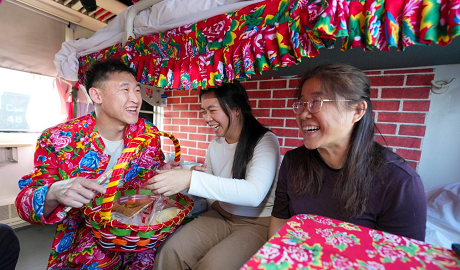

by Mahmoud Fouly
CAIRO, Feb. 20 (Xinhua) -- China's economic development path is people-oriented, with coordination between the public and private sectors to improve the lives of its citizens, said an economic consultant in a recent interview with Xinhua.
"Both the public and private sectors in China integrate to serve the state," said Moatasem Rashed, a veteran economic consultant for the Egyptian Federation of Investors Associations.
He said that China's economic model, based on coordination between the public and private sectors, led to significant achievements in infrastructure construction, poverty alleviation and urban-rural coordinated development.
"I believe that Chinese citizens today are reaping the fruits of this policy of integration between the public and private sectors," the expert emphasized.
China's experience is more like "grassroots development," with establishing development hotspots throughout China, not just in certain parts of the country, Rashed told Xinhua.
"The Chinese development model is like grassroots development in which the entire people participate in the development process," said the economist.
China's gross domestic product posted a growth of 5.2 percent year on year in 2023, higher than the annual target of around 5 percent, data from the country's National Bureau of Statistics showed in mid-January.
Rashed said that the sustainability of China's economic growth for successive years proves its success, which has led the country to become the world's second-largest economy.
He pointed out that China's opening up to partnerships with other countries, particularly developing ones, is significant for boosting economic growth in these countries.
"China's opening up to developing countries provides the latter with the modern technology and development models they need," he said, adding that Chinese projects are welcomed in developing states.
He cited the China-proposed Belt and Road Initiative (BRI) as a long-term project that seeks common development and win-win partnerships among participating states, whether bilateral or multilateral.
"The BRI aims to share and transfer the Chinese experience in development through partnerships" with all BRI partner countries, Rashed said.
He refuted Western media's claims that China's foreign economic cooperation via the BRI and other initiatives seeks dominance.
"These allegations are baseless, as proven by the constantly increasing international support for the BRI," Rashed said, arguing that "China did not impose the BRI but offered it, and other countries sought to join."
"The countries participating in the initiative found it beneficial as it helps them integrate and cooperate to achieve common interests," he explained.
"The goal of anti-China Western reports is to distort the Chinese experience," Rashed said, asserting that it has failed nonetheless.
China's cooperation with developing states is motivated by "partnerships," while the approach of Western states seeks "subordination" and "exploitation" of these countries, he added.
Noting that the West sees nothing but itself, Rashed said, "Western presence in these countries aims to control their resources." ■

Various festive events held across China to celebrate upcoming Chinese New Year


Hit epic drama sparks interest in lesser-studied chapter of ancient Chinese history

Lanterns hoisted to mark upcoming Chinese New Year in Hong Kong

"In-train fair" launched in NE China's Heilongjiang amid Spring Festival travel rush
点击右上角![]() 微信好友
微信好友
 朋友圈
朋友圈

请使用浏览器分享功能进行分享
